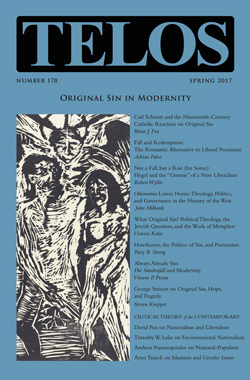The thoughts below were first presented at the 2017 Telos Paul Piccone Institute conference, “Asymmetrical Warfare: The Centrality of the Political to the Strategic.” On the perhaps naïve presumption that politics are grounded in ideals, norms, and values that guide (if not govern) societal conduct, I have extended the title to “Asymmetrical Warfare: The Centrality of the Ethical to Politics and the Strategic.” Since the writing of these remarks, Donald Trump has taken the office of president, promised a vast build-up of the U.S. military, and proposed large increases in the military budget alongside substantial decreases in humanitarian aid programs. He has detonated in Afghanistan the largest non-nuclear bomb in U.S. military history, he is saber-rattling with North Korea, and he has bombed Syria—all in his first 100 days, indicating a certain unconsidered readiness to use military force.
|
This article develops new empirical perspectives on the growing gender policy and gender role clash of civilizations now looming ahead in Western countries. The very same European governments that welcomed hundreds of thousands of migrants from countries with what the Muslim feminist Ziba Mir-Hosseini called “compulsory dress codes, gender segregation, and the revival of cruel punishments and outdated patriarchal and tribal models of social relations,” are untiringly promoting gender mainstreaming, which is now a top priority for European Union policymakers. Western feminism is at a turning point. Will it share with large sections of the green and left political currents in the West the cowardly silence about the threat of Islamist totalitarianism and terrorism, or will it develop solidarity with Muslim feminism? Telos Press is delighted to announce that Elliot Neaman’s Free Radicals: Agitators, Hippies, Urban Guerrillas, and Germany’s Youth Revolt of the 1960s and 1970s has been awarded the Silver Medal in the Europe: Best Regional Non-Fiction category at this year’s Independent Publisher Book Awards. The annual IPPY Awards showcase the best books published by independent publishers throughout North America and the English-speaking world. Twenty-five years after the end of the Cold War, there is arguably a crisis of democracy: not only has the transition from totalitarian communism failed to bring about liberal market capitalism, but politics in mature democracies has been becoming post-democratic. Models of authoritarianism and state capitalism are spreading in different parts of the world, while countries with long-standing democratic traditions are characterized by a rejection of the political mainstream and a turn to extremes on the far left or the far right. In addition to its main focus on original sin in modernity, Telos 178 (Spring 2017) features a special section of topical writing, introduced here by Russell A. Berman, that continues our ongoing commitment to setting forth a critical theory of the contemporary. Telos 178 is now available for purchase in our store.
Carl Schmitt is frequently assumed to have primarily been a Catholic intellectual, or Christian political theologian, at least until becoming alienated from the Church in the mid-1920’s. The jurist’s book Political Theology is quite logically a main source of evidence for this standard interpretation of Schmitt’s intellectual biography. However, an assumption of Schmitt’s Catholic, or even simply Christian, bona fides serves more as a distraction in understanding the origins and contours of his early thought. This mistaken narrative hides the degree to which Schmitt’s brand of secular and proto-Hobbesian decisionism is contrary to the thought of his claimed forebears among nineteenth-century counter-revolutionary Catholic theorists. |
||||
|
Telos Press Publishing · PO Box 811 · Candor, NY 13743 · Phone: 212-228-6479 Privacy Policy · Data Protection Copyright © 2024 Telos Press Publishing · All Rights Reserved |
||||



